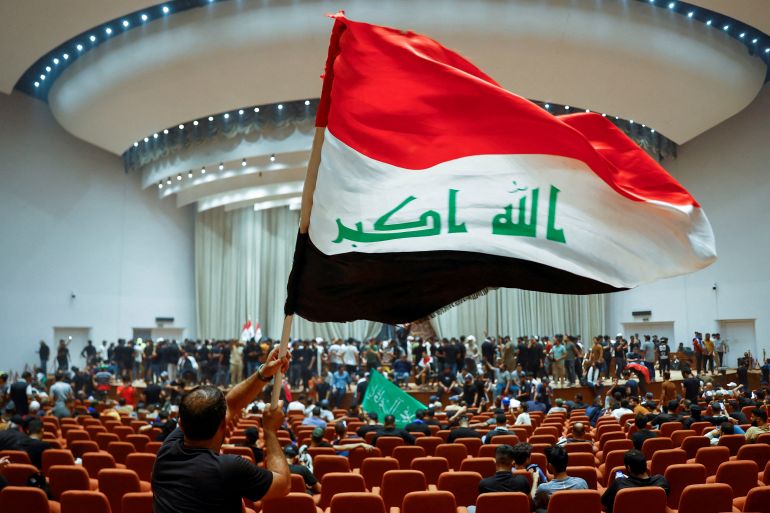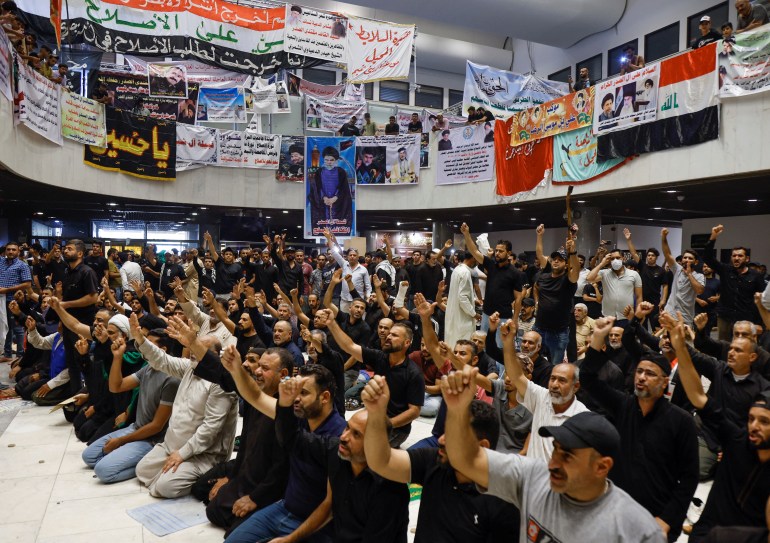Furore, indifference, confusion: Voices beyond the Iraq protests
Many Iraqis who joined anti-gov’t demonstrations in 2019 are either against or indifferent towards this bout of protests.

Baghdad, Iraq – Amir Madhlum had seen it all before.
“They are now trying to go into the Green Zone – looks familiar?” the 33-year-old texted his friends on July 27 as he saw huge crowds of protesters trying to pull down the concrete walls around the heavily fortified area in the centre of Iraq’s capital, Baghdad.
Keep reading
list of 3 itemsPhotos: Sadr supporters ready for long sit-in at Iraq parliament
Tensions soar as rival protests take place near Iraqi parliament
Over a span of three days in the past week, supporters of the influential Shia leader Muqtada al-Sadr twice breached the Green Zone and then stormed the Iraqi parliament. They later moved into the square outside the building and staged a sit-in.
The protesters’ initial goal was to stop MPs from electing Mohammad al-Sudani, nominated by al-Sadr’s opponents, as prime minister amid a deepening political deadlock that has prevented Iraq from forming an elected government nearly 10 months since a parliamentary vote that saw al-Sadr’s party win the largest number of seats in parliament.
But the firebrand leader later withdrew all of his party’s representatives from the parliament, and on Wednesday called on his supporters to continue their sit-in until a new election is held. Al-Sadr’s rivals from the Shia Coordination Framework responded by staging a counter-protest, in the latest wave of demonstrations to rock Iraq in recent years.
In 2019, it was Madhlum and his friends who were taking to the streets in a series of mass demonstrations by the Tishreen movement aimed at putting an end to the corrupt political and economic system entrenched in Iraq.
But while the Sadrist protesters faced little resistance from the security forces when they breached the Green Zone – sometimes they were even handed water by security forces under Baghdad’s scorching heat – the response towards the Tishreen protesters was vastly different.
“They shot us with guns, they beat us with batons, they chased us down the streets like rats,” Madhlum recalled.
What he described is still a painful memory for many who participated in the 2019 anti-government protests that saw peaceful demonstrators being shot by militias and security forces, while activists were later targeted and assassinated.
“For many outsiders, protests in Iraq seem to fall into one homogenous category, but Sadrists’ protests are nothing like our protests in 2019,” Madhlum told Al Jazeera. “They are on the streets defending the corrupt system that we wanted to get rid of.”
It is a sentiment seemingly shared by many Iraqis, primarily young people, who came together in 2019 to protest – they are either against or indifferent towards the current bout of protests and escalations.
“It really feels like a slap on the face that Hashd people are now protesting in front of the Green Zone, claiming to be peaceful, when it was those people who shot the protesters in 2019,” said Mustafa al-Hadad, referring to a state paramilitary grouping comprised mostly of Shia factions.
Al-Hadad and Madhlum are not alone in having lost hope for fundamental changes to the entrenched system. Last year’s polls were marked by poor voter turnout, with only about four in 10 Iraqis turning out to polling stations to cast ballots in the face of growing despair and disappointment.

“Just because the Sadrists are loud [and] everyone is afraid of them, does not mean they have the sympathy of everyday Iraqis,” Marsin Alshamary, a research fellow at Middle East Initiative, wrote on Twitter. “What we know from elections is that Sadrist voters are roughly one million in a population of 40 million.”
That said, al-Sadr still wields significant power over his loyal base. The recent ebbs and flows in protest activities among his followers were almost single-handedly commanded by him: people flowed to the Green Zone after al-Sadr called on people to revolt; and people left almost right after he asked them to leave as their “message” had been “delivered”.
Over the years, especially in the run-up to last year’s election, many have portrayed al-Sadr as a conscientious defender of Iraq’s self-governance against Iranian and United States influence. And despite the debate surrounding the veracity of such a statement, al-Sadr’s repetitive narrative of building a “national majority government” that is “not Western nor Eastern” has served its purpose: many believe that he is such a saviour to Iraq.
“Sadr might not be perfect, but I think he’s Iraq’s best option: maybe he can defend our country against Iran and America,” Ahmad al-Iraqi, a street vendor who lives next to Sadr City, the leader’s bastion, said.
It is a view echoed by many supporters of al-Sadr, regardless of whether they marched towards the Green Zone in the past week.
“I didn’t go to the protests because going into direct conflict with [pro-Iran] militias is not a good idea for Iraq, even if I believe Iran should be out,” Qais, a young man in Baghdad who voted for al-Sadr, told Al Jazeera, asking to be only identified by his first name for fear of retribution.
“And I believe [al-Sadr] is our hope for kicking out Iran.”
But for many struggling Iraqis, the recent showdown in central Baghdad is nothing but a harsh reminder that the country is still deeply mired in political and economic dysfunction, with a paralysed government and widespread corruption that strips ordinary Iraqis of basic living standards despite oil prices hitting record highs.
In Baghdad’s southeastern al-Zafraniya district, Mohammad Mahmoud, a 41-year-old electrician who lives in a small house in a rundown neighbourhood, said he did not participate in the protests because it “didn’t make sense”.
His house barely gets any electricity despite his repetitive efforts to set up wires by himself. Going to a protest sprung out to defend an intrinsically flawed political system at this moment simply is not his priority, he said.
“I don’t understand, really, why people still have energy to go for these protests when all the people at the top are looking after themselves, and they don’t really care about us,” Mahmoud added.
“Maybe the only reason I’d go is that I heard there’s air conditioning in the parliament building,” he jokingly continued. “It would be nice to have some cold in this weather.”